The Cultural Foundations of Nations: Hierarchy, Covenant, and Republic » książka
topmenu
The Cultural Foundations of Nations: Hierarchy, Covenant, and Republic
ISBN-13: 9781405177993 / Angielski / Twarda / 2008 / 264 str.
This major new work by Professor Anthony D. Smith challenges the notion of nationalism as a product of modernity.
- Major new work by a leading historical sociologist
- Challenges the prevailing idea of nationalism as a product of modernity
- Demonstrates that different political forms of community and collective identity from pre-modern times have contributed to the formation and character of nations
- Analyzes the chronology and nature of nations, from the ancient world, to the European Middle Ages, the early modern, and the modern eras
- Discusses alternative destinies facing modern nations today











